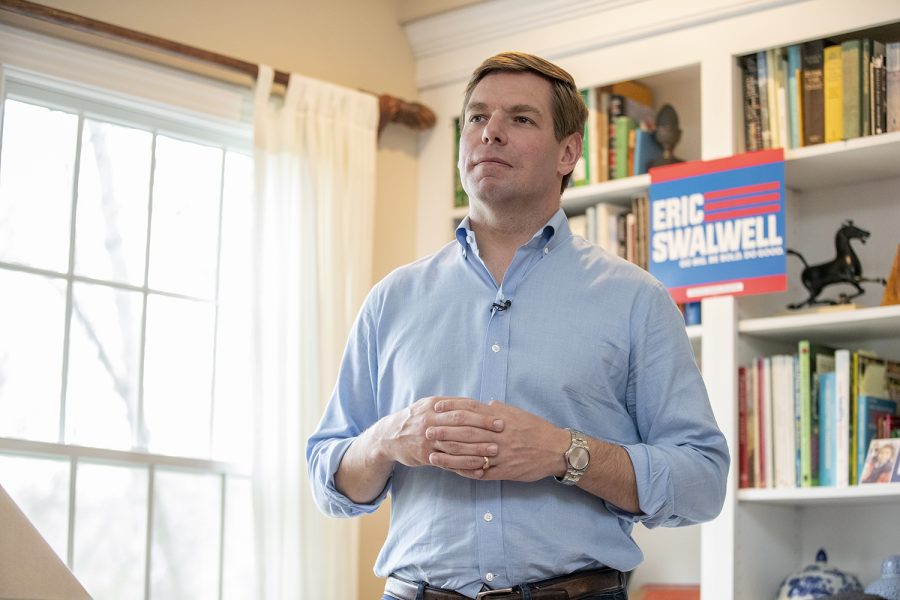Helton: 20 Out of 20: Swalwell is out — what about the other stragglers?
Here’s a quick roundup of the lower-tier candidates before they drop out of the race to become the Democratic nominee.
U.S. Rep. Eric Swalwell, D-Calif., speaks at a house party in North Liberty on Sunday, April 28, 2019. The stop was Swalwell’s first visit to Iowa since announcing his candidacy for the Democratic nomination for President.
July 8, 2019
Eric Swalwell isn’t running for president anymore. The representative from California announced the end to his extra-longshot bid for the Democratic nomination on July 8, citing low funding and polling numbers.
With this being the first major dropout of the 2020 presidential race — and no, I’m not counting former West Virginia state Sen. Richard Ojeda — we’ve reached the phase of the cycle where people are starting to give up. I already profiled Swalwell’s campaign alongside other low-profile Democratic Reps. Tim Ryan of Ohio and Seth Moulton of Massachusetts.
Before we have any more dark-horse candidates calling it quits, let’s do a quick roundup of the stragglers, egomaniacs, trying to become President Trump’s challenger next November.
Kirsten Gillibrand
Surprised to see the senator from New York on a list of “stragglers”? Me, too. If you would have asked me about the most promising 2020 candidates a year ago, Gillibrand would have been on the top of the list. But after planting her flag as one of the #MeToo Movement’s most prominent political supporters, she hasn’t gained a lot of traction among the Democratic electorate. Perhaps it’s because the coastal-centric media overplayed her campaign’s viability, or maybe she’s not the rising star many (including me) thought she could be. She may yet be due for a breakout moment, but after her performance at the first debate didn’t seem to pick up any supporters, Gillibrand is still stuck at the bottom of the polls.
Steve Bullock
Another perfectly reasonable candidate for president — a popular red-state Democrat with a proven record of executive success — who just hasn’t found any momentum in this presidential race. Bullock was re-elected as governor of Montana in 2016, the same year President Trump won the state by more than 20 points. He even received an endorsement from his friend and our own Iowa Attorney General Tom Miller. But despite have a plausible message of reaching rural America without compromising progressive values, he couldn’t even put himself in the top 20 candidates in order to qualify for the first Democratic debates (a feat even Swalwell accomplished). He could probably mount a strong campaign for Montana’s Republican-held Senate seat, but his presidential ambitions are as good as dead.
Andrew Yang
Unlike the two hopefuls listed above, Yang seems to have some upside to his campaign. Similar to another New York businessman-turned-politician, Yang doesn’t have any real qualifications for being the Commander-in-Chief. But instead of proposing border walls and Muslim bans, Yang has universal basic income and other wonky proposals to end what he calls the “war on normal people.” He’s gathered a ragtag following of mostly younger, very online supporters. I thought he could have had his break into the mainstream during the first debates, but he hardly said anything, memorable or otherwise. Yang later claimed his mic wasn’t functioning properly, so he’ll have to wait until the next debate to have his chance to sound off.
John Hickenlooper
The former governor of Colorado with a funny name is another nice-enough white dude with considerable experience that should definitely be doing something else with his time. His campaign strategy appears to be screaming “Democrats aren’t socialists” into the void while more exciting candidates rise in the polls. No matter his qualifications or record, Hickenlooper just isn’t the centrist droid Democrats are looking for. Colorado does another one of those Republican-held Senate seats up in 2020, though. Just sayin’.
Michael Bennet
How are there two irrelevant Coloradans running for president? I don’t know. OK, so “irrelevant” is probably too dismissive of a word. Sen. Bennet is one of the most respected members of Congress, known for his thoughtfulness and willingness to work with anyone. But just like his fellow Centennial Stater, the party has undergone a lot of change since the 1990s. It’s difficult to see a path forward for Bennet — or any of these longshots — but I guess he doesn’t think he has anything better to do.



